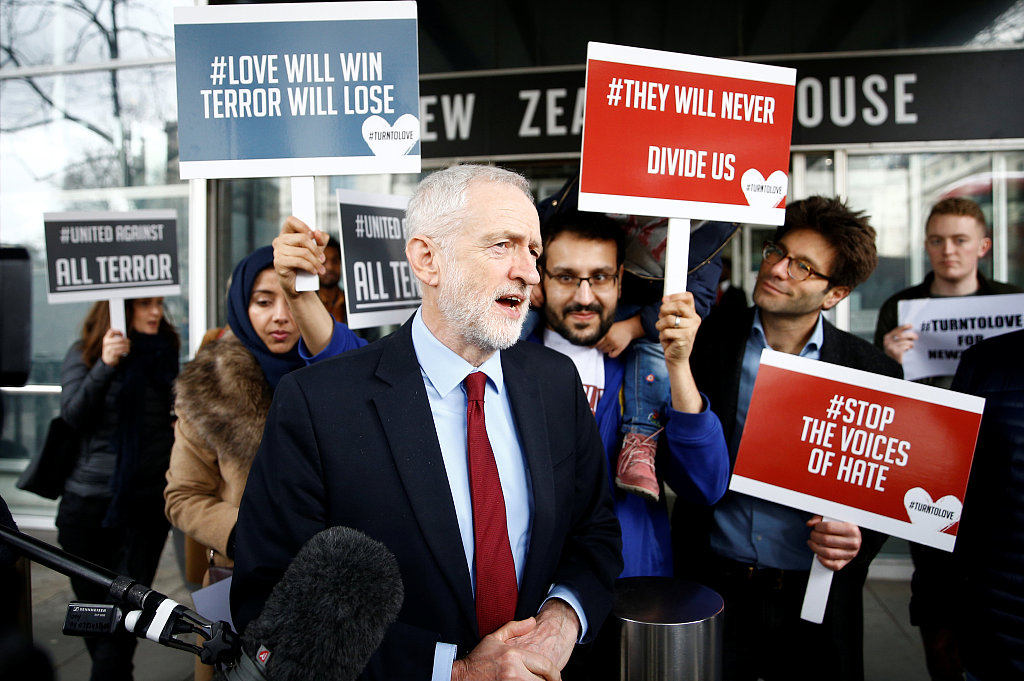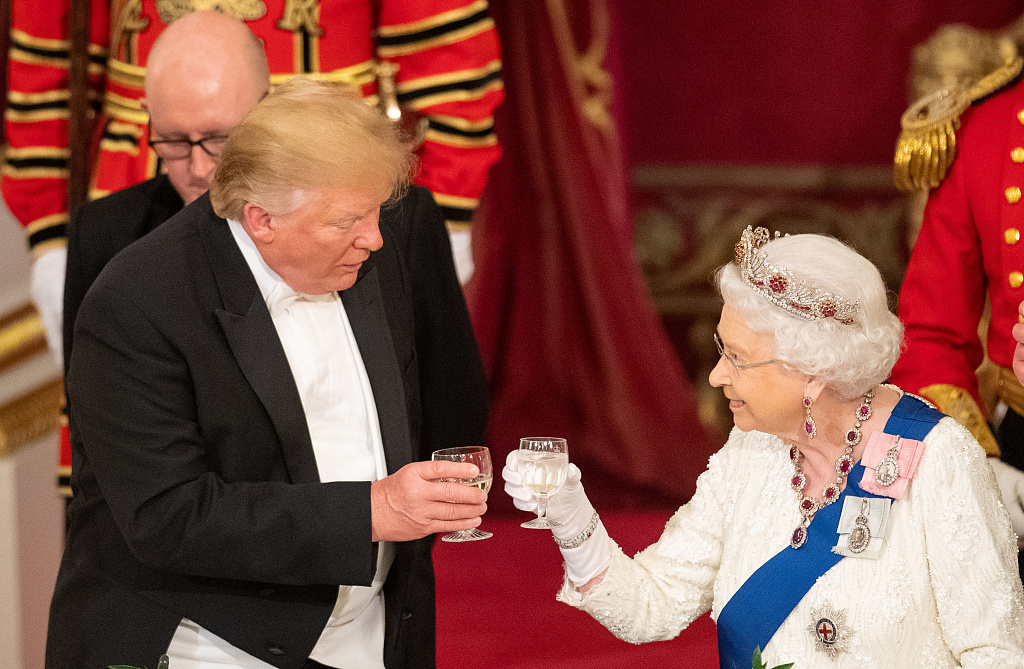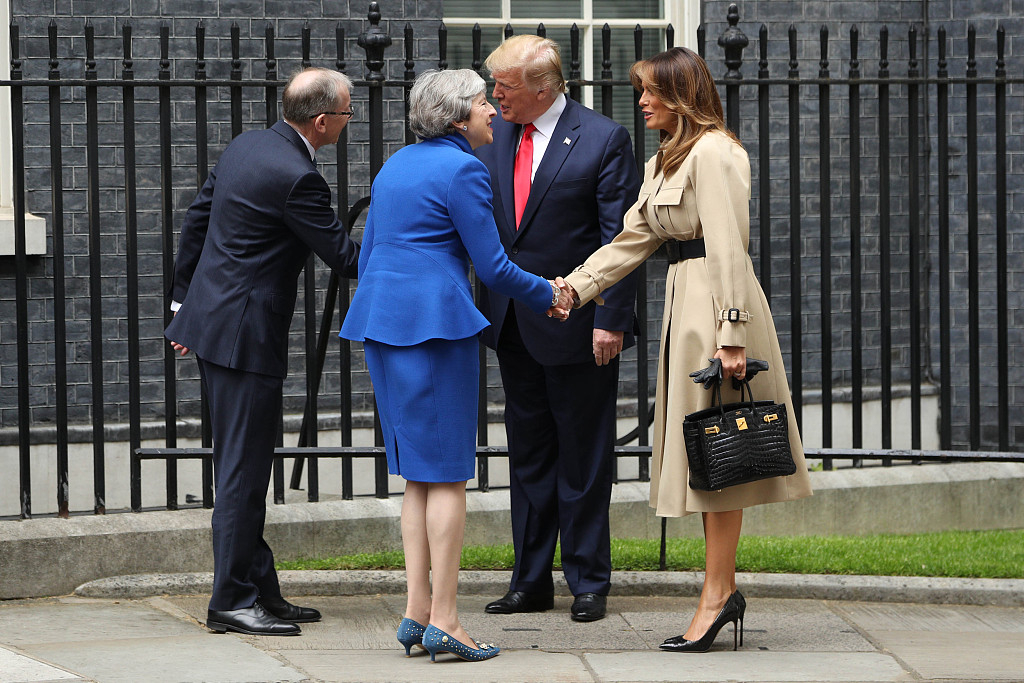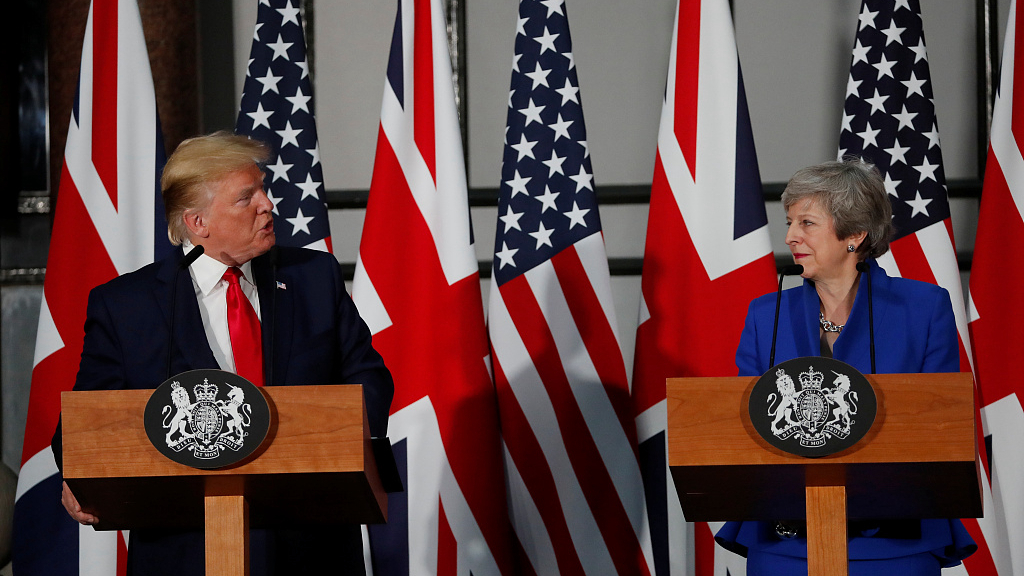Editor's note: Chris Deacon is a postgraduate researcher in politics and international relations at the University of London and previously worked as an international commercial lawyer. The article reflects the author's opinion, and not necessarily the views of CGTN.
As Donald Trump's state visit to the United Kingdom draws to a close, many opponents of the U.S. president's policies have continued to argue that an invitation should never have been extended. But can it really ever be sensible for the UK to shun the leader of by far its most important ally?
As expected, Trump's visit has seen multiple protests across London – and indeed, further afield in the UK – against his presence. Earlier this week, the protesters were even addressed by opposition Labour Party Leader Jeremy Corbyn, in support of their aims.
Corbyn, as well as other opposition politicians, had refused an invitation to the state dinner thrown in Trump's honor by the Queen. This was despite the Labour leader separately offering to meet Trump privately – an invitation that was declined by the U.S. president.

Britain's opposition Labour Party leader Jeremy Corbyn speaks to the media outside New Zealand House, following the Christchurch mosque attack in New Zealand, in London, Britain, March 15, 2019. /VCG Photo
Britain's opposition Labour Party leader Jeremy Corbyn speaks to the media outside New Zealand House, following the Christchurch mosque attack in New Zealand, in London, Britain, March 15, 2019. /VCG Photo
Some called this contradiction hypocritical, although Corbyn argues that, while he would meet Trump to discuss his policy disagreements, he was opposed to the holding of such a grand – and, in his opinion, unnecessary – occasion in the dinner. It seems at best naïve, however, to think that Trump would agree to such a meeting after Corbyn's conduct.
One must also ask the question as to, if a general election was called in the near future and Corbyn was to win it (a distinct possibility, given the current political situation in the UK), whether Corbyn would really shun such an occasion as prime minister, likely resulting in major damage to the so-called “special relationship” between the UK and the U.S.?
In many ways, this behavior is reflective of a pattern among those sympathetic to Corbyn's world views. Corbyn, for example, is happy to meet and share platforms with people of deeply questionable character, including members of terrorist organizations such as Hamas, whom he called his “friends”; but attending a dinner with the U.S. president is apparently beyond the pale.
This selective disgust smacks of double-standards and someone who is not yet ready to face the real world of international politics, where sometimes the greater good of the national interest requires you to speak to and deal with people who you do not agree, and may even find repugnant.

U.S. President Donald Trump and Britain's Queen Elizabeth raise their glasses to make a toast at the State Banquet at Buckingham Palace in London, Britain, June 3, 2019. /VCG Photo
U.S. President Donald Trump and Britain's Queen Elizabeth raise their glasses to make a toast at the State Banquet at Buckingham Palace in London, Britain, June 3, 2019. /VCG Photo
For the UK, this cannot be truer of any relationship other than that with the United States. The U.S. is more important than any other British ally by a factor of several times. More than that, intelligence sharing between the two countries likely affects the safety of countless other citizens across the world.
To be unable to detach the man of Donald Trump from the office of President of the United States is, therefore, a short-sighted mistake. Even if one did hope to change Trump's mind on policy issues – or, indeed, anything else – speaking to him is clearly the way to do this. Alienating and making an enemy of him, while satisfying the common contemporary need for virtue-signaling, would only harm the British people.
And what better way for the UK to exercise its influence than with a state visit? The UK's royal family, and Queen Elizabeth II, in particular, are iconic across the world. To be hosted by them on such a visit would likely be a major milestone for even the most prominent of world leaders. Such a visit and the effect it can have on world leaders is the very definition of soft power and one of the UK's greatest assets in its diplomacy.

Philip May, British Prime Minister Theresa May, U.S. President Donald Trump, and first lady Melania Trump arrive at 10 Downing Street for a meeting on the second day of the U.S. president and first lady's three-day state visit in London, Britain, June 4, 2019. /VCG Photo
Philip May, British Prime Minister Theresa May, U.S. President Donald Trump, and first lady Melania Trump arrive at 10 Downing Street for a meeting on the second day of the U.S. president and first lady's three-day state visit in London, Britain, June 4, 2019. /VCG Photo
Trump himself has repeatedly spoken of his admiration for the Queen and openly looked forward to a state visit. To not use this for the UK's advantage – including lobbying on issues of disagreement – would have been a major error. Some might say that Trump would be unlikely to listen, but he clearly likes Theresa May (no matter how short her remaining time in power) and was eager to praise her at the joint press conference held by the two leaders.
All those protesting against Trump's presence in London have the right to do so. Indeed, this sort of activism should be encouraged, provided it is peaceful and law-abiding. But for the government to be criticized for hosting Trump, and for prominent opposition politicians to shun him, betrays an immature and naïve attitude regarding world politics and the UK's interests.
Very little in this world is achieved without talking. Having the ear of the most powerful leader in the world, no matter how unequal the relationship or how much one dislikes the individual, can be extremely helpful in furthering one's goals. Willful ignorance of this reality would only serve to harm the interests of all the UK's citizens.
(If you want to contribute and have specific expertise, please contact us at opinions@cgtn.com.)





